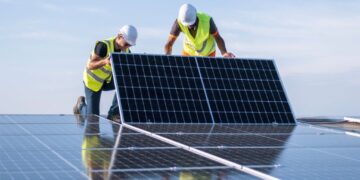The energy industry holds a crucial position of providing a product as well as service which is essential to the world economy and consumers.
However, African governments are failing to bridge the energy gap and unleash the continent’s true potential.
According to a report, the number of people without electricity access globally has dropped, from 1.2 billion in 2010 to 840 million in 2017. The report also predicts that by 2030, there will still be about 650 million people without access to electricity, and 9 out of 10 of them will live in Sub-Saharan Africa.
Access to electricity has not only been identified as an essential element for socio-economic development, but also contributes towards poverty reduction in society.
African governments are halfway through the First Ten-Year Implementation Plan (2014-2023) of the African Union’s Agenda 2063, and have 10 years left to achieve the globally agreed 2030 Agenda and its Sustainable Development Goals (SDGs).
Now more than ever, the ability and capacity to monitor progress, and to swiftly adapt resources and policies accordingly, is critical to effectively implement both agendas.
The quality, availability, timeliness and use of basic economic and demographic data to inform policy remain significant challenges across Africa.
With information, investor confidence grows.
With confident investors, money flows and that’s when real, sustainable development happens. Information is power, but ask any trade minister trying to promote his or her country without adequate data, and you will understand lack of information is powerlessness.
Data in developing countries is often outdated or incomplete.
Too often, African countries do not possess updated data for crucial indicators. Household surveys are irregular: Their scope, comprehensiveness, quantity, and quality vary wildly.
One reason for these data gaps is inadequate funding and limited autonomy among national statistical offices.
Data collection, handling, archival and analysis is still expensive in terms of capacity, logistics and financial implications for most countries in sub-Saharan Africa.
In many African countries, a highly skilled workforce capable of collecting, producing, and disseminating official statistics is a rare resource. Many statistical systems are understaffed and their employees insufficiently trained.
Data is the first, crucial step. Then you need smart, objective analysis to make sense of the data and shape the narrative. Once the data supply side is up to par, the hope is that decision makers at all levels will increasingly demand relevant information to lay the foundation for policy making and budgeting.
Intelligent data leads to smart decisions.
In the absence of critical data, researchers end up relying on rules-of-thumb passed down from year to year, with no basis for re-evaluating the underlying assumptions. This may lead to an unwarranted convergence in the outcomes of analyses, in that they may reinforce a bias against changing dynamics on the ground as they are unable to fully capture them.
Without this data, an opportunity would be lost to bolster efficiency gains and better mobilize investments.
For instance, mini-grid developers would struggle to find their markets, utilities would be less efficient in directing grid extension programs, and investors can’t accurately allocate resources where they will have the biggest impacts.
In general, development programs entail measurable results. Development decisions should be informed by data. But more importantly, this data must be turned into information that is easy to understand and useful to end users.
These challenges are the same from Senegal to Somalia, and though each country is unique, the overarching problems are identical for investors because they cannot fully understand their expected risk and returns.
Donors and development agencies need better and more granular data to ensure that their projects meet their full potential. Financial institutions, multilateral development banks and donors use data to better understand how to get their funds to the places they’re most needed, and how to power projects to their full potential.
Developing continent-wide implementation entry points, will provide the much needed bridge between energy access and economic empowerment, that has been missing so far.
Understanding these markets is essential.
More than ever, information is power.























